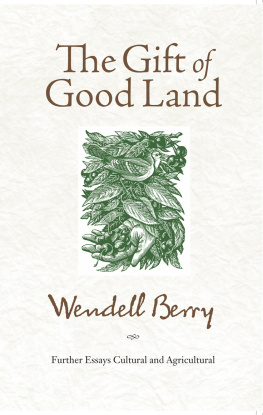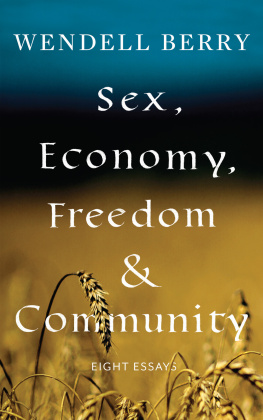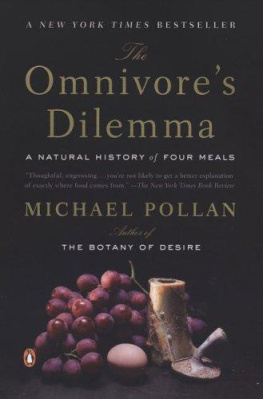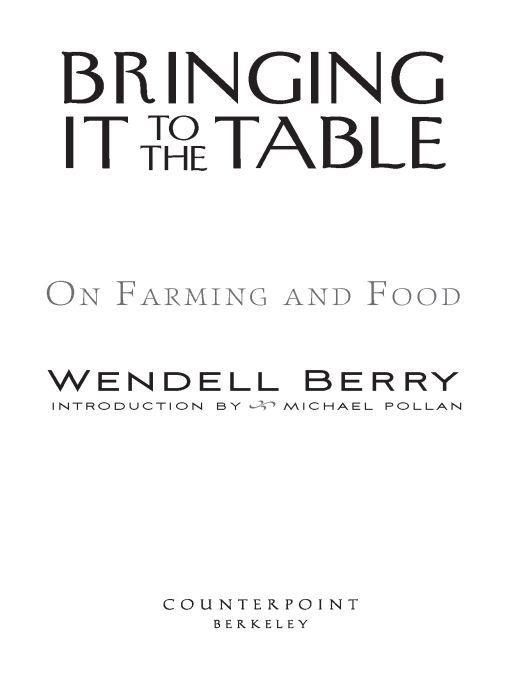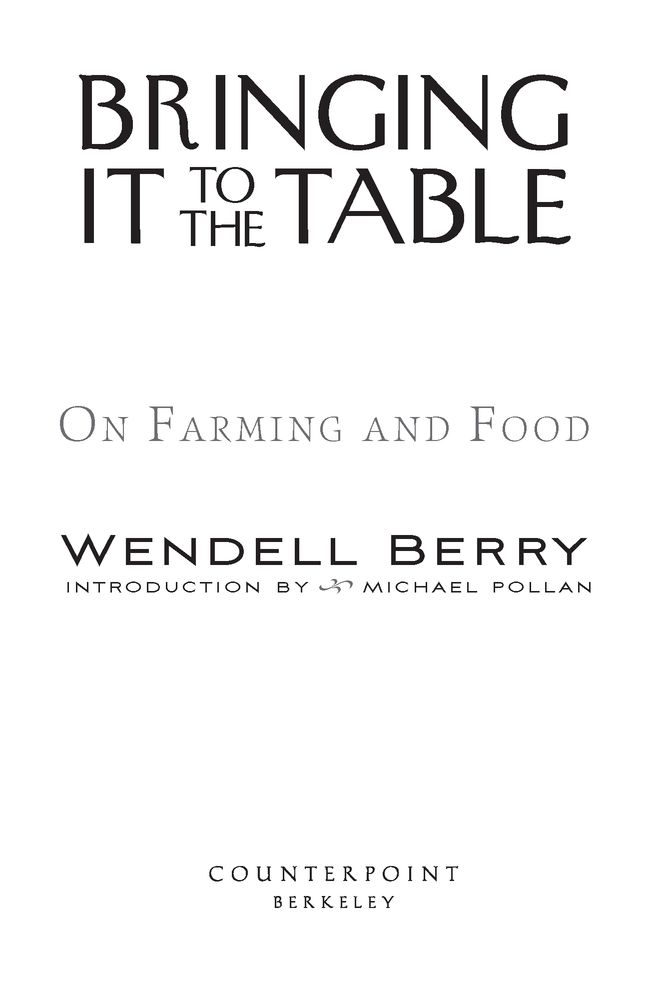Table of Contents
OTHER BOOKS OF ESSAYS BY WENDELL BERRY
Another Turn of the Crank
The Art of the Commonplace
Citizenship Papers
A Continuous Harmony
The Gift of Good Land
Harlan Hubbard: Life and Work
The Hidden Wound
Home Economics
Life Is a Miracle
Long-Legged House
Recollected Essays: 1965-1980
Sex, Economy, Freedom and Community
Standing by Words
The Unforeseen Wilderness
The Unsettling of America
The Way of Ignorance
What Are People For?
INTRODUCTION
by Michael Pollan
A FEW WEEKS AFTER Michelle Obama planted an organic vegetable garden on the South Lawn of the White House in March 2009, the business section of the Sunday New York Times published a cover story bearing the headline Is a Food Revolution Now in Season? The article, written by the papers agriculture reporter, said that after being largely ignored for years by Washington, advocates of organic and locally grown food have found a receptive ear in the White House.
Certainly these are heady days for people who have been working to reform the way Americans grow food and feed themselvesthe food movement as it is now often called. Markets for alternative kinds of foodlocal and organic and pasturedare thriving, farmers markets are popping up like mushrooms, and for the first time in more than a century the number of farmers tallied in the Department of Agricultures census has gone up rather than down. The new secretary of agriculture has dedicated his department to sustainability and holds meetings with the sorts of farmers and activists who not many years ago stood outside the marble walls of the USDA holding signs of protest and snarling traffic with their tractors. Cheap words, you might say, and it is true that, so far at least, there have been more words than deeds, but some of those words are astonishing. Like these: Shortly before his election, Barack Obama told a reporter for Time that our entire agricultural system is built on cheap oil and went on to connect the dots between the sprawling monocultures of industrial agriculture and, on the one side, the energy crisis and, on the other, the health care crisis.
I have no idea if Barack Obama has ever read Wendell Berry, but Berrys thinking had found its way to his lips.
Americans today are having a national conversation about food and agriculture that it would have been impossible to imagine even a few short years ago. To many Americans it must sound like a brand-new conversation, with its bracing talk about the high price of cheap food, or the links between soil and health, or the impossibility of a society eating well and being in good health unless it also farms well. But to read the essays in this sparkling anthology, many of them dating back to the 1970s and 1980s, is to realize just how little of what we are saying and hearing today Wendell Berry hasnt already said, bracingly, before.
And in that we I most definitely, and somewhat abashedly, include myself. I challenge you to find an idea or insight in my own recent writings on food and farming that isnt prefigured (to put it charitably) in Berrys essays on agriculture. There might be one or two in there somewhere, but I must say that reading and rereading these essays has been a deeply humbling experience.
It has also been a powerful reminder that the national conversation now unfolding around the subject of food and farming really began back in the 1970s, with the work of Berry and a small handful of his contemporaries, including Francis Moore Lapp, Barry Commoner, and Joan Gussow. All four of these writers are supreme dot connectors, deeply skeptical of reductive science, and far ahead not only in their grasp of the science of ecology but in their ability to actually think ecologically: to draw lines of connection between a hamburger and the price of oil, or between the vibrancy of life in the soil and the health of the plants and animals and people eating from that soil.
I would argue that the conversation got under way in earnest in 1971, when Berry published an article in The Last Whole Earth Catalogue introducing Americans to the work of Sir Albert Howard, the British agronomist whose thinking had deeply influenced Berrys own since he first came upon it in 1964. Indeed, much of Berrys thinking about agriculture can be read as an extended elaboration of Howards master idea that farming should model itself on natural systems such as forests and prairies, and that scientists, farmers, and medical researchers need to reconceive the whole problem of health in soil, plant, animal and man as one great subject. No single quotation appears more often in Berrys writing than that one, and with good reason: It is manifestly true (as even the most reductive scientists are coming to recognize) and, as a guide to thinking through so many of our problems, it is inexhaustible.
That same year, 1971, Lapp published Diet for a Small Planet, which linked modern meat production (and in particular the feeding of grain to cattle) to the problems of world hunger and the environment. Later in the decade, Commoner implicated industrial agriculture in the energy crisis, showing us just how much oil we were eating when we ate from the industrial food chain; and Gussow explained to her nutritionist colleagues that the problem of dietary health could not be understood without reference to the problem of agriculture. Looking back on this remarkably fertile body of work, which told us all we needed to know about the true cost of cheap food and the value of good farming, is to register two pangs of regret, one personal, the other more political: first, that as a young writer coming to these subjects a couple of decades later, I was rather less original than I had thought; and second, that as a society we failed to heed a warning that might have averted or at least mitigated the terrible predicament in which we now find ourselves.
For what would we give today to have back the environmental crisis that Berry wrote about so prophetically in the 1970s, a time still innocent of the problem of climate change? Or to have back the comparatively manageable public health problems of that period, before obesity and type 2 diabetes became epidemic? (Most experts date the obesity epidemic to the early 1980s.)
But history will show that we failed to take up the invitation to begin thinking ecologically. As soon as oil prices subsided and Jimmy Carter was rusticated to Plains, Georgia (along with his cardigan, thermostat, and solar panels), we went back to businessand agribusinessas usual, carelessly dropping the thread of the conversation that Berry had helped to start. In the mid-1980s, Ronald Reagan removed Carters solar panels from the roof of the White House, and the issues that Berry and the others were raising were pushed to the margins of national politics and culture. I worked as an editor at Harpers Magazine during the 1980s, and occasionally published Berrys speeches and essays. During the Reagan years Berry was often regarded, at least in the Manhattan media precincts I inhabited, as a Luddite and a crank and generally as something of a literary and philosophical antique. At a time when everyone else was trading in their typewriters for personal computers, I published his short essay about his refusal to use a typewriter that elicited howls of derision from readers. In those days even the word agriculture felt hopelessly out-of-date, something that a culture consumed with the idea of post-modernism had exactly no use for.





